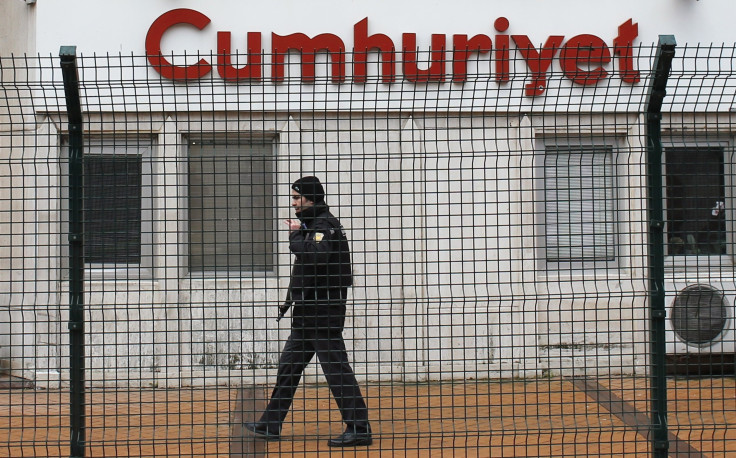Turkey's Charlie Hebdo Case: Cumhuriyet Journalists Sentenced For Republishing Controversial Cartoon

Two prominent journalists have been jailed in Turkey for republishing a controversial Charlie Hebdo cartoon of the Prophet Muhammad last year, Turkey's official Anadolu Agency reported Thursday. Hikmet Cetinkaya and Ceyda Karan, both columnists for Turkey’s opposition Cumhuriyet newspaper, were each handed a two-year sentence in a case that fueled an ongoing debate over press freedom in the nation.
The journalists went on trial last January on charges of “inciting public hatred” and “insulting religious values.” They were acquitted of the latter charge. Defense lawyer Bulent Utku vowed to appeal the ruling. Taking to Twitter, Karan criticized the Turkish government.
"Let our two-year sentence be a gift for our liberal fascists #JeSuisCharlie," Middle East Eye quoted her saying, translated from Turkish.
#TURKEY #BLASPHEMIE .... ? for Reprint#JesuisCharlie #CharlieHebdo #Cover
— ISTANBUL THEMES (@ISTANBUL_THEMES) April 28, 2016
2 Years in Jail for @ceydak ? #Appeal pic.twitter.com/lUpRBbhQu2
Most media in Turkey — as well as around the world — decided against publishing the cartoons. An image from Charlie Hebdo appeared twice in Cumhuriyet, complementing columns by Cetinkaya and Karan, in the first issue published following the bloody attack on Charlie Hebdo’s offices in Paris. Twelve people were killed by extremists in those attacks in January 2015.
Turkey’s Prime Minister Ahmet Davutoğlu called the publication of the cartoon an “open provocation.”
Cumhuriyet has been heavily critical of the AKP government, a moderate-Islamist party, which came to power in 2003 vowing to usher in greater freedoms. President Recep Tayyip Erdoğan, previously prime minister, has overseen the country as it has largely overturned the old secular order, ending government restrictions on the Muslim headscarf and building new religious institutions nationwide.
The decision to publish parts of the cartoon sparked widespread controversy and debate last year.
“Those who disregard the sacred values of Muslims by publishing forms allegedly referring to our Prophet are clearly committing a provocation,” Deputy Prime Minister Yalcin Akdoğan said on Twitter at the time. “The fact that those who irresponsibly target the values of society publicly express it via media or through art doesn’t change its aggressive nature.”
Cumhuriyet has come under increased scrutiny lately. Its editor-in-chief, Can Dündar, is facing multiple possible life sentences for allegedly revealing state secrets. Press freedom activists have been heavily critical of the case. The 2016 World Press Freedom Index ranked Turkey number 151 out of 180 countries in free press.
© Copyright IBTimes 2024. All rights reserved.












